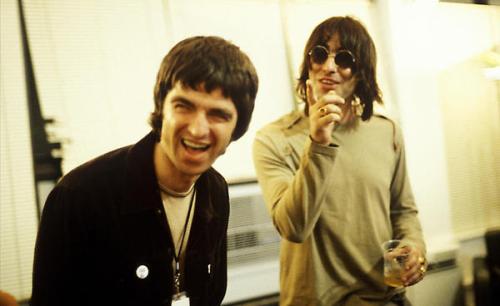
Well, it’s finally over… apparently. The pantomime dames that are Noel and Liam Gallagher have finally drawn the curtain on the self-appointed ‘biggest-band-in-Britain’ once and for all (although whether Noel can be tempted back once more into the breech is a moot point). Now seems as good a time as any to assess the legacy the band will leave behind, and, at this juncture, it doesn’t look too rosy.
When Oasis first arrived on the main stage of popular culture, I was just about the dead centre of their (supposed) demographic. 11 years old, white, male, northern – perfect. I was also struggling to carve out an identity in a Britain that, at the time, didn’t seem to have too much to offer. So, along came Oasis with Union Jack guitars and songs that were fairly easy to imitate and, like so many, I bought it hook, line and sinker. I’m not ashamed to say that I loved Oasis. I was an Oasis fan. I loved the bravado, the ‘us against the world’ rhetoric. I loved the volatility, the bickering and when Liam stuck his forks up at a camera. But, in the words of Saint Paul; “when I was a child, I spoke as a child”. That’s the problem, the brothers Gallagher have singularly failed to put aside childish things for over 15 years – and they weren’t exactly children to begin with! I mean, I have a younger brother and we used to argue and fight and say we couldn’t stand to be around each other – when we were children. To see two brothers in their forties still doing it is just embarrassing. Their resolute inability to change even slightly has meant they have faded, ungracefully, into ever increasing irrelevance and it is sad in every sense of the word.
In his book, ‘The Republic’, Plato (now hold on, I’m going somewhere with this…ish) sets out an allegory for man’s ability to discover and ‘see’ the truth around him in a passage called ‘the simile of the cave’. In it, he says, there are a number of stages of seeing the real world. The first stage is like watching the silhouette of shadow puppets[1] flickering on the back wall of the cave. The next stage is actually seeing the puppets themselves. Next, you come out of the cave, but look at the world via the reflections in a pool of water. Finally, you see the real world as it is. Oasis have managed to do this journey of enlightenment in reverse. ‘Definitely Maybe’ had an ethos that ran throughout. It managed to capture, however briefly, a mood that rang true and connected with a lot of people (this writer included). ‘(What’s the Story) Morning Glory’, for all its anthemic, sing-along moments, was an imitation (albeit a tremendously successful one) of what had come before. ‘Be Here Now’ was a cruel parody[2] of the vision that the band had created of themselves and the music scene they had helped to reinvigorate. It’s almost admirable to boast about being the biggest band in the world when you patently aren’t – it’s aspirational. But when you’re saying it as a multi-millionaire, who has some claim to this mythical title, it just makes you sound like a twat. Finally, ‘standing on the shoulders of giants’ and the other albums (I really don’t think I know their names or how many others there are) are as close to real meaning and relevant social commentary as watching shadow puppets on the walls of a cave is to seeing the real world. Watching Oasis live recently[3] was like looking at something vaguely memorable through a pane of frosted glass. All that could be made out was the vaguest of outlines, the merest hint of that old excitement.
In conclusion, Oasis’ legacy will be this: a warning. It will be a siren that rings out across the ages, preying all aspiring bands take heed. “Don’t go on too long”, it will say. “Quit while you’re ahead – while you still have some dignity and sense of moral conviction”, it will plead. “For God’s sake, at least try to change with the times – modify you message to make it relevant” it will warn “or suffer the fate of Oasis – to die a dinosaur, re-hashing former glories to stadia of fans trying to re-live their own lost youth”. If only they has quit after ‘What’s the Story’, they would probably have been talked about in the same reverential tones as ‘The Smiths’. If they had stopped after ‘Be Here Now’, they’d have been a fond memory. Even if they’d called it a day after ‘Standing on the Shoulders of Giants’ they’d have at least has some dignity. But no. They just kept on going. That’s the lure of the industry I suppose. One more album. One more roll of the dice. One more compromise. One more cynical look back at an imagined past. “You and I are gonna live forever.”
TA
‘Supersonic’, their debut single from 1994
‘Falling Down’ released earlier this year
[1] Think those Indonesian Gamelan puppets
[2] Literally in the case of the album’s lead track ‘d’you know what I mean’ which used exactly the same chord sequence as ‘Wonderwall’
[3] I saw them on some ITV music show hosted by ubiquitous gob-shite Fearne Cotton – which I admit is perhaps not the best vehicle to express genuine emotion – but they presumably chose to go on it.

I wouldn’t be the first person to say they peaked at the beginning – indeed your article says it, and i agree. The following 15 years have been carried by their bravado/hooligan brand, a well marketed idea that much of the knuckle dragging British public have lapped up. It’s all quite amazing, really.